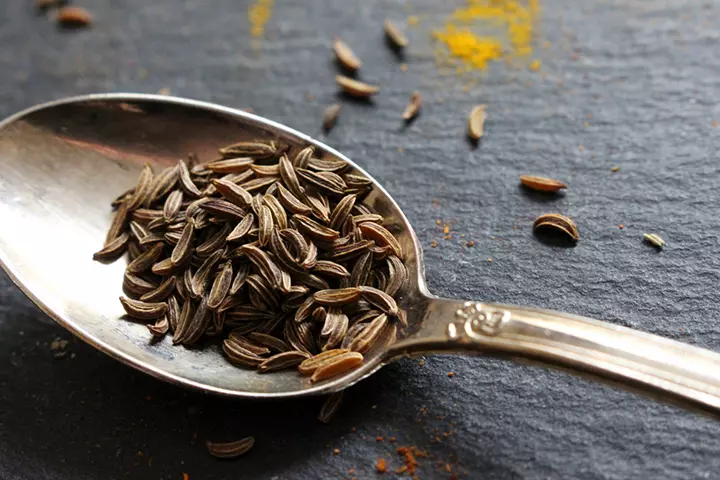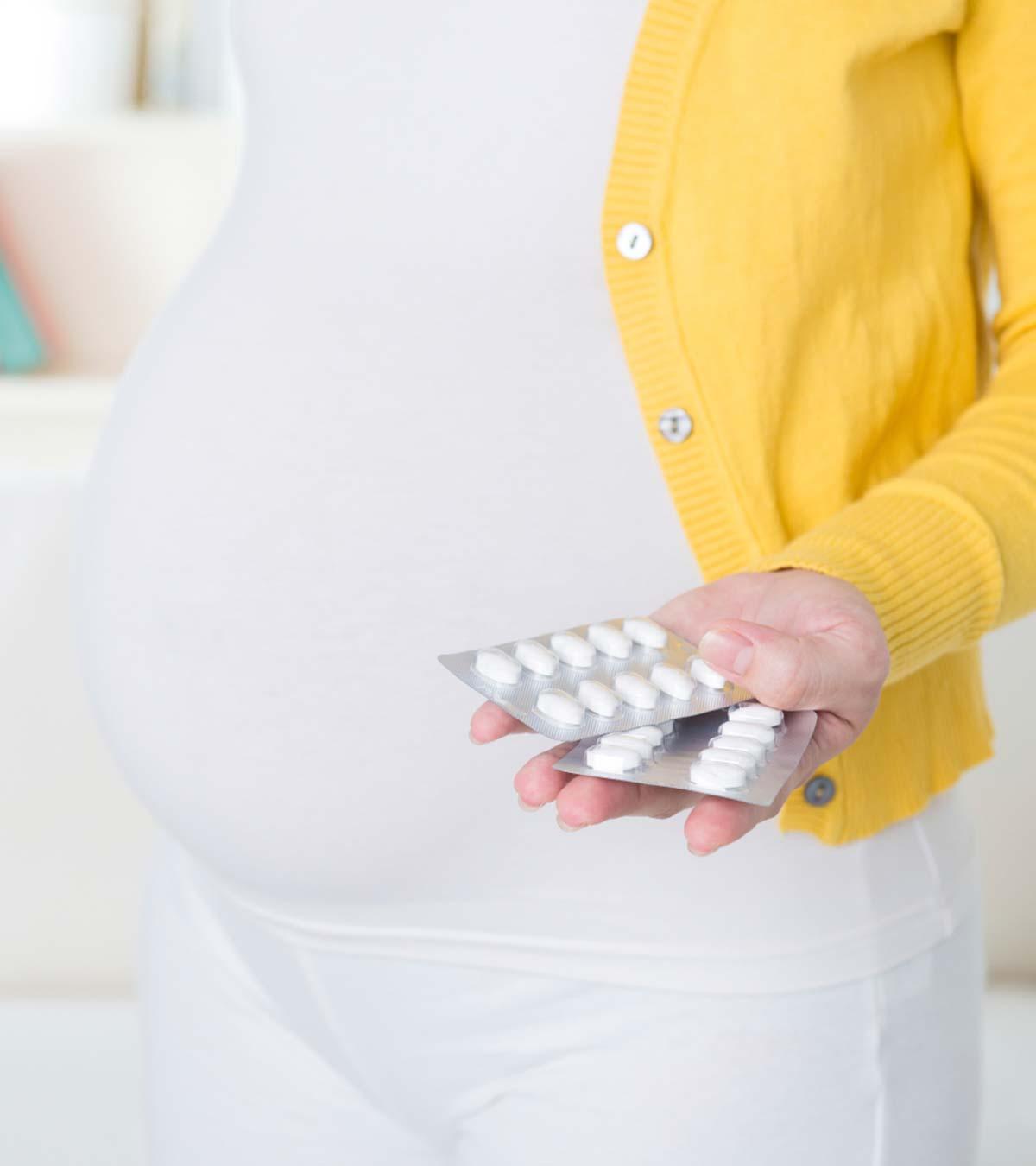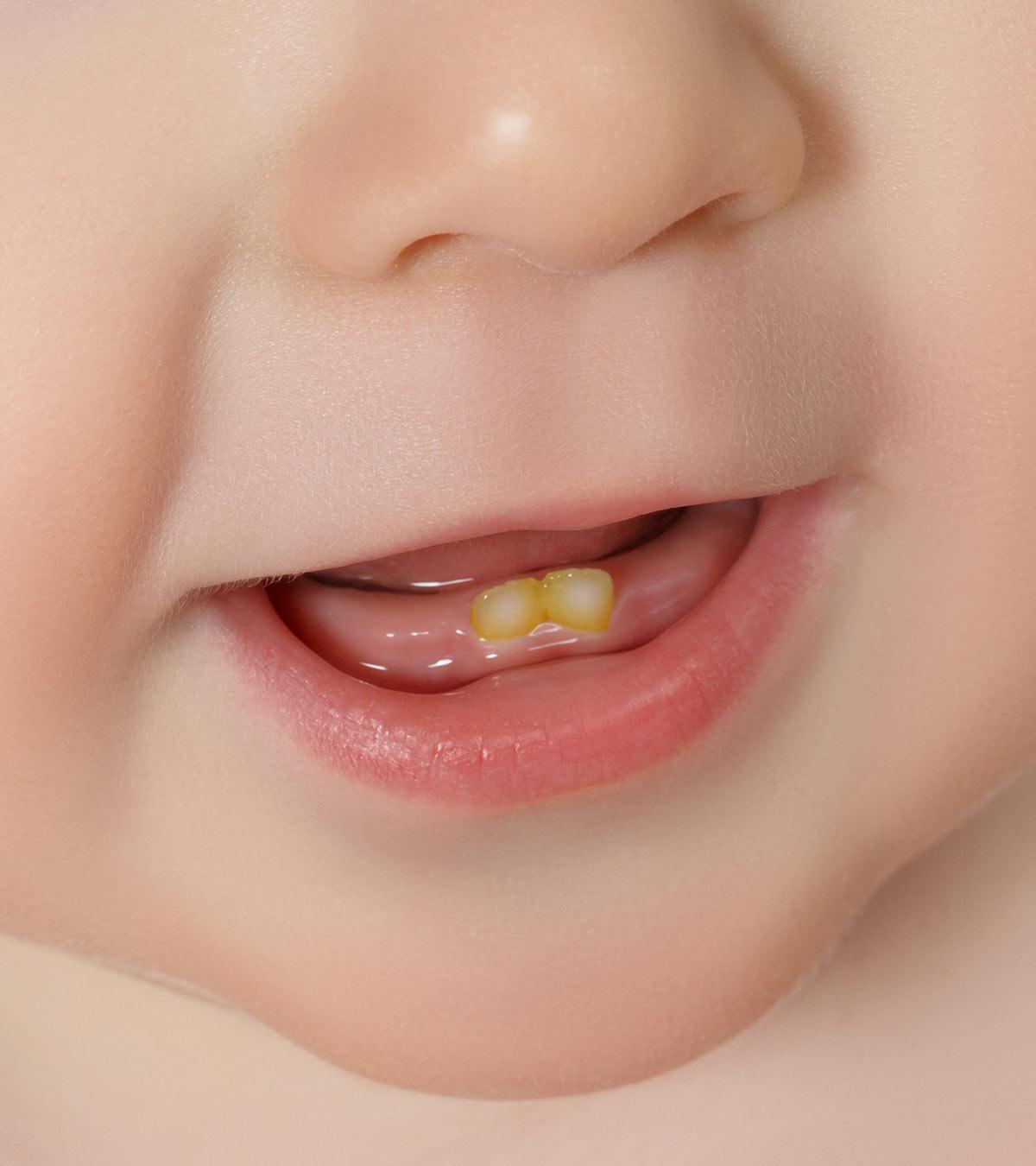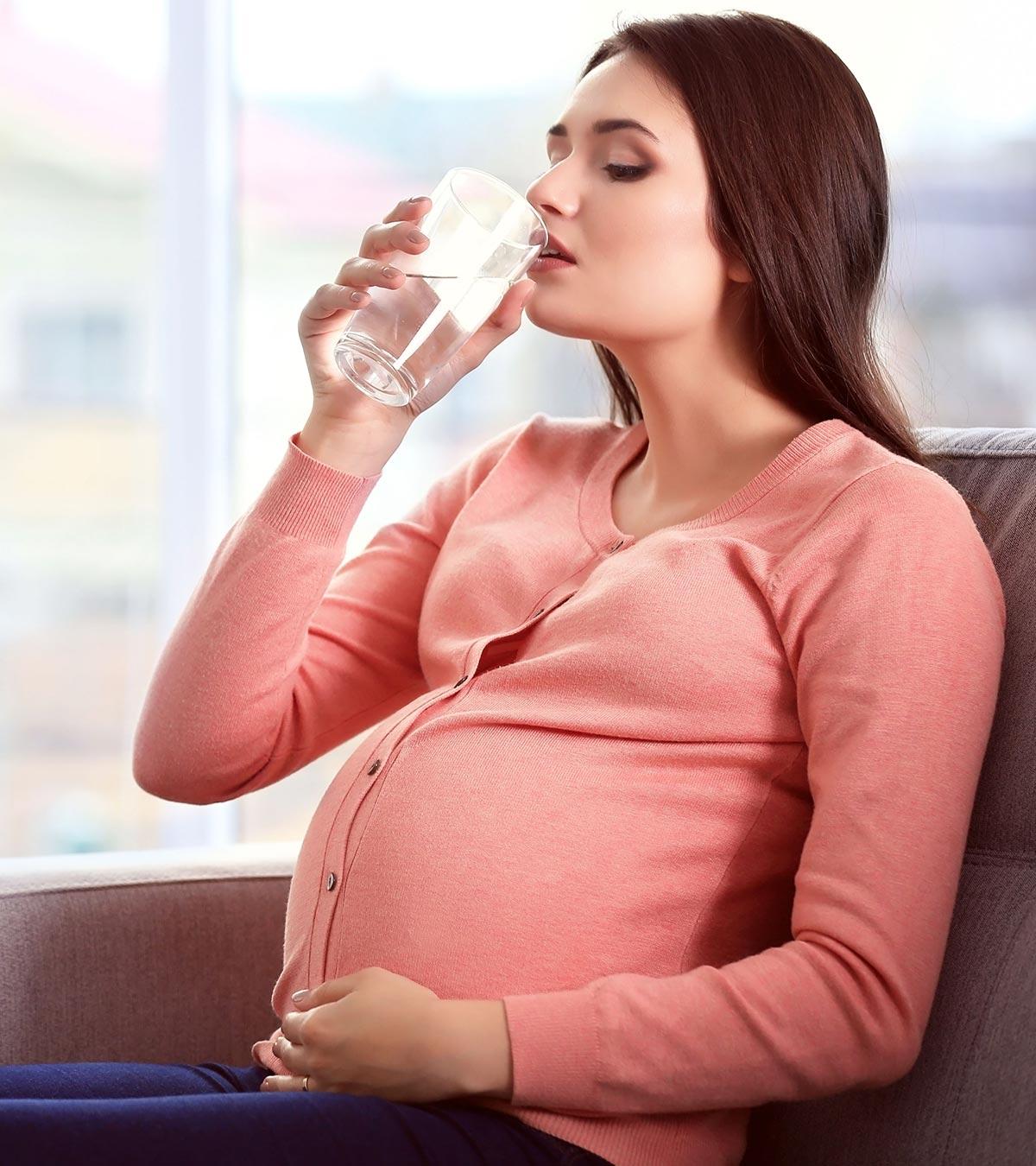
Image: ShutterStock
Digestion problems or acid refluxes can lead to chest pain during pregnancy. Although mild and short-term pains in the chest may be common in pregnant women, they can also result from serious underlying conditions. Hence, if the pain lasts for prolonged durations and starts to affect your health, consult a doctor.
In this post, we will help you understand chest pains while pregnant, including their causes and ways to cope with them.
Is Chest Pain Normal During Pregnancy?
A feeling of fullness or discomfort in your chest is not abnormal during pregnancy (1). However, you may have to see a doctor if there is numbness down your arm or persistent pain, causing shortness of breath.
Causes Of Chest Pain During Pregnancy
Chest pain may be a result of a few regular problems that pregnant women face. It could also be due to something more severe. The likely causes of chest pain while pregnant are:
1. Indigestion and heartburn
Image: Shutterstock
Indigestion, acid reflux, or eating fatty food can trigger heartburn, thereby causing pain or a burning sensation in the chest. These could be because of the increasing hormonal changes and the growing fetus that presses against your belly (2).
 Quick fact
Quick fact2. Infection
Chest infection is one of the principal causes of chest pain. It is essentially the disease of the airways (3).
The causes mentioned above result in mild pain and may not be a cause for panic. But chest pain during pregnancy could also be due to a few serious causes, which we list down next.
3. Deep vein thrombosis
Deep vein thrombosis (DVT) is a medical condition that refers to a blood clot in a deeper vein, usually in the leg or pelvis. The blood clot in the leg can travel up your body and reach the lungs, and may, therefore, cause chest pain, pulmonary embolismiA condition in which blood vessels in the lungs are blocked by blood clots, thereby obstructing blood circulation , or in some cases that go undiagnosed and untreated, death (4).
4. Coronary heart disease (CHD)
In this condition, plaque builds up in the walls of the arteries, causing them to get narrower over time. This may restrict the flow of blood, leading to chest pain (angina pectoris) or heart attack (myocardial infarction) (5).
5. Asthma
Image: Shutterstock
According to the National Institutes of Health, bronchial asthma (BA). is one of the most chronic ailments in pregnancy and may affect about 4% to 8% of all pregnancies If you are having mild asthma or have experienced it in the past, it could recur or worsen during pregnancy. There might be tightness in the chest because of that, resulting in chest pain (6).
6. Peripartum cardiomyopathy
This is a cardiac condition where the heart muscle becomes weak and diseased (7). Although rare, this condition might develop during the five months after delivery or a month before delivery. It may bring up symptoms such as chest discomfort, heart palpitations, malaiseiA state of feeling unwell or extremely weak with no definitive cause , and fatigue (8).
7. Aortic dissection
It is a tear in the wall of the aorta, the largest artery.
Blood accumulates in between the layers of the aorta, eventually leading to aortic rupture that is presented with severe and tearing chest pain (9).
 Did you know?
Did you know?How Prevalent Are Cardiovascular Diseases During Pregnancy?
Cardiovascular diseases may be prevalent in about 1-30% of all pregnancies. The physiological changes during pregnancy may lead to cardiometabolic conditionsiA cluster of diseases caused by interrelated risk factors associated with metabolic and cardiovascular disorders . The graph below shows the cases of heart failure peaking in the postpartum weeks of 1-4. During pregnancy, they are the highest during the 19-22 weeks. 19-22 weeks is also the period when preeclampsiaiA pregnancy-related disorder characterized by high blood pressure, protein in the urine, and fluid retention and gestational hypertensioniA pregnancy-induced condition where a woman develops elevated blood pressure are likely to set in.
Cardiovascular diseases over various weeks of pregnancy
Source: Ramlakhan, K.P., Johnson, M.R. & Roos-Hesselink, J.W. Pregnancy and cardiovascular disease. Nat Rev Cardiol 17, 718–731 (2020).How To Get Relief From Chest Pain During Pregnancy?
In case your chest pain is accompanied by shortness of breath, dizziness, and weakness, you need to see a doctor as soon as possible. However, if the pain is benign, you may try the below measures.
Note that these do not help in treating the root cause and only ease the chest discomfort temporarily.
- Watch your posture: Make sure you are giving your lungs enough space. Don’t slouch. Sit and stand straight to allow enough oxygen to enter your lungs.
Image: IStock
- Take it easy: Don’t overtire yourself. Rest as much as you can.
- Use a cushion: Prop yourself up a little with a pillow while lying down on your bed. It could help you breathe easily.
 Quick tip
Quick tip- Don’t sleep soon after a meal: No matter how tired you are, try not to lie down immediately after a meal.
- Eat small portions: During pregnancy, it makes sense to eat smaller meals at regular intervals to prevent acidity, heartburn, gastroesophageal reflux disease GERDiA chronic digestive disease when stomach acid repeatedly moves back to the food pipe, leading to heartburn , etc.
- Prenatal supplements are vital: Don’t forget to take your prenatal vitamins regularly.
- Say no to stress: When you are pregnant, the stress levels can skyrocket. So, bust stress and anxiety through meditation and yoga, or other ways that help you.
- Avoid things that cause bloating: Stay away from alcohol, caffeine, oily and spicy foods, all of which can cause gas and indigestion.
Image: Shutterstock
- Eat healthily: Eat healthy and balanced meals, which give you enough vitamins and minerals.
- Exercise: Regular exercise might keep you healthy and guard against infectious attacks.
Do Home Remedies Help Relieve Chest Pain?
People try some age-old remedies for easing indigestion or heartburn and other conditions that could cause chest pain. But there is little or no scientific evidence to support their effectiveness. Most of them are harmless, so you may want to try after talking to your doctor.
- A glass of warm milk with honey.
- A handful of almonds might help in digestion.
- A cup of tender coconut water is an effective acid neutralizer.
- Add two teaspoons of caraway seeds in some boiling water and allow it to steep for 10 minutes. Drink the strained liquid; you may use sweeteners if you like.
Image: Shutterstock
Please note that there are no studies to support these claims, which are mostly used by women based on popular beliefs.
Frequently Asked Questions
1. What foods should I avoid for chest pain on the right side?
If you have chest pain on the right side, avoiding foods that can lead to gas, such as dairy products, beans, broccoli, cauliflower, foods with artificial sweeteners, and fried foods, may help relieve the pain.
2. What does preeclampsia chest pain feel like?
If you have preeclampsia, you may experience rib pain, towards the right of the upper abdomen, or at the back of the breast bone. The pain may also feel like heartburn.
3. Is chest pain normal at the end of pregnancy?
You may experience chest or breast pain towards the third trimester or the last three months due to enlargement of the breast or expanding rib cage. These changes are considered normal towards the later stage of pregnancy (9).
4. Can I get chest pains in early pregnancy?
Chest pains in early pregnancy often result from common causes such as acid reflux, morning sickness, heart ailments, pre-existing lung conditions such as respiratory infections, asthma, bronchitis, indigestion, and pleurisy, and growing breast size (11) (12). However, under rare circumstances of ectopic pregnancy, unexplained sharp pain in the chest combined with abdominal cramps may indicate a rupture (13).
5. Can labor cause chest pains?
Dr. Michael Green, a board-certified obstetrician-gynecologist from Lake Arrowhead, California, says,“ During labor, it is possible to experience chest pain, but it’s essential to differentiate between normal labor sensations and signs of a medical emergency. While chest pains can sometimes be associated with intense contractions and pressure on the chest during labor, it’s important not to dismiss any chest pain in case it is a more serious issue.”
Chest pain during pregnancy is generally caused by gastrointestinal reasons, including heartburn, indigestion, chest infections, and serious cardiac conditions such as coronary heart disease and DVT. If you have severe, prolonged chest pain accompanied by breathing difficulties and fatigue, you must seek immediate medical care. If your pain is acute, you may try certain tips such as eating in smaller portions, maintaining proper posture, practicing healthy eating, and exercising to ease the chest discomfort. Note that minor chest pain is not a reason for worry, but take your doctor’s opinion before trying any treatment measures for chest pain.
Infographic: Tips To Get Relief From Chest Pain During Pregnancy
Occasional and self-resolving chest pain could be harmless while pregnant. So, if you experience mild chest discomfort or pain, try these simple measures to ease the pain. However, if the pain persists or is accompanied by other symptoms, contact your doctor promptly. Illustration: Momjunction Design Team
Key Pointers
- Chest discomfort during pregnancy is common and has many causes.
- Chest pain during pregnancy can be due to various reasons, including indigestion, infection, and heart diseases.
- As the uterus grows in later stages of pregnancy, it can put pressure on the diaphragm, leading to chest discomfort and breathing problems.
- After 27 weeks of pregnancy, indigestion-related chest discomfort is more likely.
- If chest discomfort persists or makes breathing difficult, it’s best to consult a doctor.
Image: Dalle E/MomJunction Design Team
Are you feeling an uncomfortable sensation in your chest and wondering if it is benign or serious? Learn more about what chest pain could mean in this informative video.
References
1. Chest Pain During Pregnancy: When to Worry; University of Pittsburgh Medical Center
2. Indigestion and heartburn in pregnancy; NHS (2017)
3. Chest Infection; NHS (2017)
4. Understanding Your Risk for Blood Clots with Pregnancy; CDC
5. Coronary heart disease and pregnancy; NHS (2018)
6. Eman Shebl and Rebanta K. ChakrabortyAsthma in Pregnancy(2023)
7. Anirban Bhattacharyya et al.; Peripartum Cardiomyopathy A Review; Tex Heart Inst J (2012)
8. Lisa Kinney-Ham et al.; Acute Aortic Dissection in Third Trimester Pregnancy without Risk Factors; West J Emerg Med (2011)
9. 5 reasons of chest pain during pregnancy that your didn’t know; Sitaram Bhartia Institute of Science and Research
10. Karishma P. Ramlakhan, et al.; Pregnancy and cardiovascular disease; Nature Reviews Cardiology (2020)
Read full bio of Dr. Monica Agarwal
- Dr. Michael Green is a board-certified OB/GYN living in Lake Arrowhead, CA. He studied medicine at St. Louis University of Medicine and completed a Family Medicine Residency at the Ventura County Medical Center. Dr. Green did a second residency in Obstetrics and Gynecology at The Carolinas Medical Center in Charlotte, NC. In addition, he holds a masters degree in Chemistry from the California State University Northridge. With over 17 years experience, Dr. Green currently works as a site director for OBHG at Northridge Medical Center in Northridge, CA.
 Dr. Michael Green is a board-certified OB/GYN living in Lake Arrowhead, CA. He studied medicine at St. Louis University of Medicine and completed a Family Medicine Residency at the Ventura County Medical Center. Dr. Green did a second residency in Obstetrics and Gynecology at The Carolinas Medical Center in Charlotte, NC. In addition, he holds a masters degree in Chemistry from the California State University Northridge. With over 17 years experience, Dr. Green currently works as a site director for OBHG at Northridge Medical Center in Northridge, CA.
Dr. Michael Green is a board-certified OB/GYN living in Lake Arrowhead, CA. He studied medicine at St. Louis University of Medicine and completed a Family Medicine Residency at the Ventura County Medical Center. Dr. Green did a second residency in Obstetrics and Gynecology at The Carolinas Medical Center in Charlotte, NC. In addition, he holds a masters degree in Chemistry from the California State University Northridge. With over 17 years experience, Dr. Green currently works as a site director for OBHG at Northridge Medical Center in Northridge, CA.
Read full bio of Swati Patwal
Read full bio of Aneesha Amonz



























